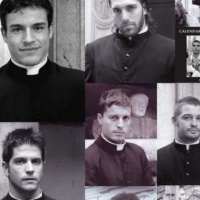If you remember, last Sunday we thought about words that don’t have loving actions being empty and meaningless.
We considered the damage that vicious, sarcastic, cruel words can have.
And we referenced what James wrote in his letter about the tongue being a deadly weapon, insofar as while it can be used to praise God and our neighbours, it can also ignite (as it were) a forest fire.
Remember his words, “the tongue is a small part of the body…..”. Then adds “Consider what a great forest is set on fire by a small spark. The tongue also is a fire, a world of evil among the parts of the body”
But how many folk have we come across, who destroy others with their, slander, mockery, spite and malice?
It even extends to those who are supposedly Christians.
When I was the NHS healthcare chaplain for NHS Dumfries and Galloway, my first office at the Infirmary also had the patient print out list for ministers who were visiting their Parishioners.
One in particular was a right joker…. or so he thought.
Now, it’s probably not escaped your attention that I’m more like Zacchaeus in stature than Goliath!
The visiting clergyman would usually say, on coming into this shared office- “don’t get up (oh you are!).”
One conversation somehow got round to my not drinking milk (I was probably making a cup of coffee at the time)
“You don’t drink milk – what not even CONDENSED milk?”
Oh how we chuckled!
Especially when he added, “But, surely, you’re going to have some SHORTbread with your cuppa!”
This was a few years ago, of course – and I’m still 5 feet 5”…………..
…………
………………And sadly…… he’s now 6 feet under!!!!
Oh, I mentioned Goliath…. and that brings me to David, the shepherd boy who became a King.
David was the youngest of Jesse’s sons. His brothers were obvious choices for kingship, in that they were big brawny lads.
But David was held in such low regard by his own family that he wasn’t even invited to the ceremony organised by Samuel.
In fact, he was out in the fields looking after the sheep – the work of a servant.
And look at this: David isn’t even mentioned by name. His father refers to him only as “the youngest” such was the low esteem in which he seems to have been held.
How did his brothers react. Who knows. But they were there, we’re told, when he was anointed.
My guess is that either they couldn’t care less, or worse, made fun of someone whom they considered a butt for their jokes and teasing.
In today’s society, it is so often the apparently weakest who are targets for mockery or abuse.
This spirit of mockery is spreading like wildfire at home, school, college, with youngsters especially suffering online or actual bullying.! Mocking, teasing, criticising and humiliating the victim are corrosive.
When my late wife, Helen, underwent not-too-wonderful reconstruction at a certain hospital in Livingston, she was drugged up to the eyeballs with morphine, other heavy duty analgesics as befits such radical surgery and the emotional trauma that is coterminous with it.
After a couple of nights – post operation – she got out of her bed, opened the door and, in a total daze, wandered down the corridor toward the exit.
The crackle of dimwit nurses at the station, looking up from comparing their “adventures” and showing off their latest phone photos, suddenly noticed this disorientated woman heading toward the door.
“What are you doing, Helen?” patronisingly
“I need to speak to my husband”
“Back to bed with you”
No suggestion that they would phone me in the morning to say that she was distressed.
The next morning, she apologised.
And the response: “Don’t worry – it gave us all a good laugh!”
A good laugh?
Probably the same kind of mentality that would have had them visiting “lunatic asylums”, as they were called in those days, to look at the patients shouting and dribbling and “doing tricks” (unintentionally).
Rich Londoners flocked to Bedlam to laugh at the antics of the inmates: a visit to the madhouse was a good day out, ranking with a public execution and featuring in all the popular tourist guides.
Why don’t we all have a laugh at those with emotional, mental or physical disabilities?
Do you remember that most moving film, “The Elephant Man”?
It tells the true story of Joseph Carey Merrick. He was an urbane and intelligent man with very severe deformities who was first exhibited at a freak show as the “Elephant Man”
Merrick was born in Leicester, and began to develop abnormally during the first few years of his life: his skin appeared thick and lumpy, he developed enlarged lips, and a bony lump grew on his forehead, one of his arms and both of his feet became enlarged and at some point during his childhood he fell and damaged his hip, resulting in permanent lameness.
This “freak” was exhibited as some kind of monstrosity for the amusement of the punters at a freak show, where he was mocked and laughed at.
However, he was rescued from this appalling cruelty by a doctor, Frederick Treves, and went on to become well known in society circles in London
The Elephant man…….in the name of entertainment.
How easy for many people to have a laugh at those who are not “normal” (aye, but there’s the rub: what is normality and just who is “normal” here?)
And it’s not something from the politically incorrect past.
The ancient comic tradition of mocking people’s impairments is still going strong today.
Should we be laughing at, for example, Jack Douglas’s comic turns in the Carry On films for resembling epileptic fits and Ronnie Barker’s character Arkwright in Open All Hours for using his stutter to get a cheap laugh.
There’s also a tradition in British comedy dating from Shakespeare to laugh at characters’ lack of intellect.
But that’s fiction……how about reality?
Dr Tom Shakespeare of the University of Newcastle explained that: “People have always found those who look different or behave differently to be figures of fun. It’s a way to bolster your own social norms by denigrating others.”
On one occasion, many moons ago, I was at a particular conference for mental health care chaplains and one of the “guest” speakers told a “joke” along similar lines to this:
“I was walking past the mental hospital the other day, and all the patients were shouting ,’13….13….13′
“The fence was too high to see over, but I saw a little gap in the planks and looked through to see what was going on.
“Somebody poked me in the eye with a stick.
“Then they all started shouting ’14….14….14”
One of my mental health care chaplaincy colleagues – a sensitive and caring man – looked at the lecturer, and very quietly and in measured tones, said, “Who is that ‘joke’ directed at?”
Laugh with; never laugh at
Remember – from our story about David being chosen:
Man judges by the outward looks, but God looks at the heart






